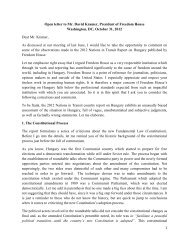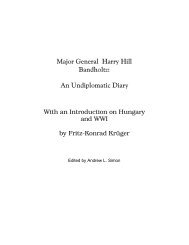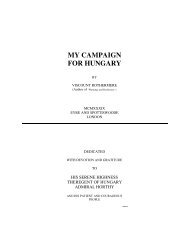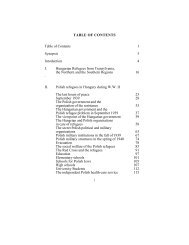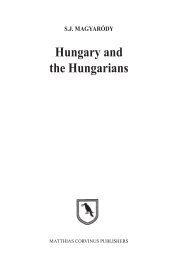The Fate of Western Hungary 1918-1921 - Corvinus Library ...
The Fate of Western Hungary 1918-1921 - Corvinus Library ...
The Fate of Western Hungary 1918-1921 - Corvinus Library ...
You also want an ePaper? Increase the reach of your titles
YUMPU automatically turns print PDFs into web optimized ePapers that Google loves.
unchanged and calm everywhere in <strong>Western</strong> <strong>Hungary</strong>.” 401<br />
At noon the following day, the 17 th , Köller again informed: “In front <strong>of</strong> the<br />
Italian captain located in Nezsider, the people <strong>of</strong> Királyhida arrested and carried<br />
<strong>of</strong>f as hostages, not released to this day by the Austrians, are exposed to the<br />
most horrible brutality.” <strong>The</strong> management <strong>of</strong> the Hungarian Railways /MÁV/<br />
turned to PM Bethlen in a telegram sent in the early afternoon because the<br />
Austrians cut the railway’s only telegraph line along the Bruck–Királyhida–<br />
Pándorfalu line. “Our technician sent to effect repairs to the line has been<br />
rudely prevented from doing it. As a result, we are unable to communicate with<br />
the Bruck–Királyhida stations at this time.” In early evening, a telegram sent by<br />
Villani to PM Bethlen, on instructs <strong>of</strong> Commissioner Sigray, disclosed: “Count<br />
Sigray begs Your Excellency that the government accept ambassador Kánya’s<br />
view that it will not be us who clear the territory <strong>of</strong> rebels but leave it to the<br />
Austrians. And that, generally, we will not accept responsibility for the results,<br />
as the free-troops will not obey the government. Removal by armed force will<br />
meet with great difficulty (…) Hungarian soldiers would have to fight against<br />
Hungarian patriots.” 402<br />
In the meanwhile, Marquis Della Toretta, Italian Foreign Minister, went to<br />
Vienna on September 11 and asked Gaetano Castagneto, Italy’s ambassador in<br />
Budapest, to join him. <strong>The</strong> marquis informed Chancellor Schober that the<br />
Hungarian government asked him to mediate. It was during these talks that the<br />
so-called Sopron formula was created, which Castagneto took to Budapest, as<br />
well as the September 14 suggestion by Foreign Minister Miklós Bánffy, which<br />
became the basis for future negotiations. <strong>The</strong> crux <strong>of</strong> the latter was: the<br />
Hungarian government will immediately evacuate and hand over to Austria the<br />
questionable <strong>Western</strong> <strong>Hungary</strong> strip to the indicated Trianon border, if it<br />
receives assurance for the permanent retention <strong>of</strong> Sopron and its surrounding,<br />
and receives a prospect <strong>of</strong> a just border designation. Bánffy’s proposal was<br />
handed to Chancellor Schober on September 15. 403 This was taken by the<br />
Austrian government that the sole means <strong>of</strong> relinquishing was after a plebiscite.<br />
On the same day, the secret Austrian-Hungarian negotiations began, with<br />
Italian mediation, which shortly resulted in the outlines <strong>of</strong> the later so-called<br />
Venice Protocol. However, in this situation, the Hungarian government had to<br />
take definite steps to disarm the rebels.<br />
On September 18, Lt.Gen. Hegedűs informed PM Bethlen in the late<br />
evening hours: “According to a report <strong>of</strong> the district command in Szombathely,<br />
Lt.Col. Prónay is alleged to be in Felsőőr. Thus, he is in zone ‘A’, which is at<br />
this time outside my jurisdiction. This in spite <strong>of</strong> the fact that the local<br />
401 MOL. K 26. 1388. csomó. 1922–„H” tétel, p. 539.<br />
402 Ibid, pp. 541–542. Kálmán Kánya was, at this time, Secretary <strong>of</strong> State for Foreign<br />
Affairs, permanent deputy <strong>of</strong> the Foreign Minister, as well as his chief secretary. <strong>The</strong><br />
‘ambassador’ title refers is to the fact that he conferred several times with leading<br />
Austrian politicians regarding <strong>Western</strong> <strong>Hungary</strong>. [In Hungarian, ‘ambassador’ also<br />
carries the meaning <strong>of</strong> ‘go-between’-ed.]<br />
403 Ormos, 1990, op. cit., pp. 131–132.<br />
152




